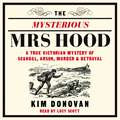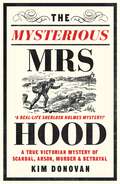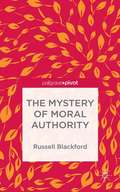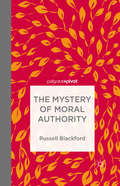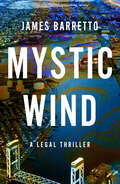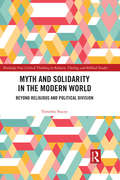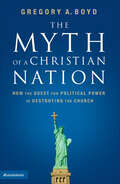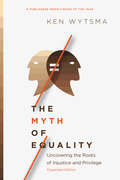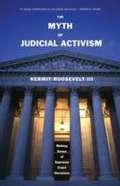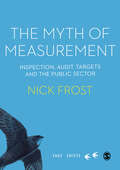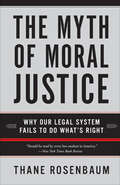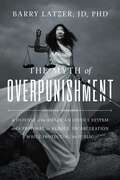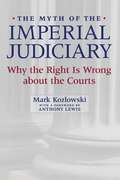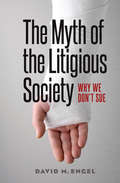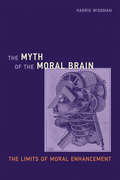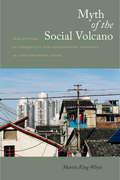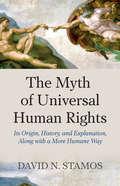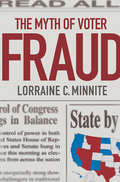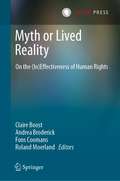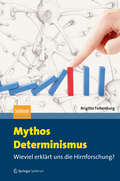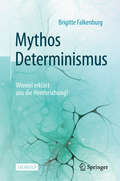- Table View
- List View
The Mysterious Mrs Hood: A True Victorian Mystery of Scandal, Arson, Murder & Betrayal
by Kim Donovan'A gripping story of a cold-blooded murder... This is true crime at its best' Wendy Moore'A true crime thriller that pulls you in, with drama so addictive it should be illegal' Sam ChristerA true Victorian murder mystery...Great Yarmouth, September 1900: A young woman is found dead on the beach, a bootlace tied tightly around her neck. Despite her death attracting national attention in the press, nobody claims her. Detective Inspector Robert Lingwood of the Great Yarmouth police force declares he will not rest until the mystery of the young woman's death is solved. But it's only once the case has been referred to Scotland Yard that the layers of mystery start to peel away... 'Mrs Hood' was in fact Mary Jane Bennett, and this is her story. Following clues and tracking red herrings leads the police to close in on their one and only suspect. With arson, fraud, an affair and a sensation-hungry press, the murder gripped the nation in one of the most eagerly anticipated trials of the early twentieth century. Author Kim Donovan finally tells her great-great-aunt's story and the truth of evil duplicity in Victorian England.'As atmospheric and absorbing as any murder mystery... A combination of your favourite whodunnit and your favourite true crime podcast. A real triumph!' Books by Your Bedside blog*A fascinating historical true crime case perfect for fans of The Suspicions of Mr Whicher and The Five*
The Mysterious Mrs Hood: A True Victorian Mystery of Scandal, Arson, Murder & Betrayal
by Kim Donovan'A gripping story of a cold-blooded murder... This is true crime at its best' Wendy Moore'A true crime thriller that pulls you in, with drama so addictive it should be illegal' Sam ChristerA true Victorian murder mystery...Great Yarmouth, September 1900: A young woman is found dead on the beach, a bootlace tied tightly around her neck. Despite her death attracting national attention in the press, nobody claims her. Detective Inspector Robert Lingwood of the Great Yarmouth police force declares he will not rest until the mystery of the young woman's death is solved. But it's only once the case has been referred to Scotland Yard that the layers of mystery start to peel away... 'Mrs Hood' was in fact Mary Jane Bennett, and this is her story. Following clues and tracking red herrings leads the police to close in on their one and only suspect. With arson, fraud, an affair and a sensation-hungry press, the murder gripped the nation in one of the most eagerly anticipated trials of the early twentieth century. Author Kim Donovan finally tells her great-great-aunt's story and the truth of evil duplicity in Victorian England.'As atmospheric and absorbing as any murder mystery... A combination of your favourite whodunnit and your favourite true crime podcast. A real triumph!' Books by Your Bedside blog*A fascinating historical true crime case perfect for fans of The Suspicions of Mr Whicher and The Five*
The Mystery of Moral Authority
by Russell BlackfordThe Mystery of Moral Authority argues for a sceptical and pragmatic view of morality as an all-too-human institution. Searching, intellectually rigorous, and always fair to rival views, it represents the state of the art in a tradition of moral philosophy that includes Thomas Hobbes, David Hume, and J.L. Mackie.
Mystic Wind (A Jack Marino Legal Thriller #1)
by James BarrettoThe last remaining fragment of truth—hidden in the mire of the Mystic Creek Boston star-prosecutor-turned-corporate-attorney Jack Marino has risen fast and far from his upbringing in the Mystic housing projects. But after he's savagely beaten in retaliation for his work as head of the District Attorney's Urban Gang Unit, he's fired because his powerful boss is running for governor and fears the beating may have shaken Jack's formidable confidence. Jack lands a plush suite at his father-in-law's mega law firm, making big money practicing corporate law. Although he seemingly has everything—money, privilege, and an heiress for a wife, what he doesn't have is his own self-respect. When he is given a chance to get back into criminal law—this time as defense counsel in a capital murder case—he finally feels alive again. But to save his client from death row, he'll face a criminal network far more organized and powerful than he could have imagined. The case will take Jack back to the projects he thought he'd escaped. He'll risk personal and professional ruin, and ultimately his very life, to fight the corrupt forces determined to see his client go down—forces that may have already given absolute immunity to the real killer.Perfect for fans of John Grisham and Scott Turow
Myth and Solidarity in the Modern World: Beyond Religious and Political Division (Routledge New Critical Thinking in Religion, Theology and Biblical Studies)
by Timothy StaceyIn the context of the rise of reactionary politics across the globe, this book seeks new ways of developing solidarity across religious, political and economic differences. Drawing on an increasingly influential Christian theological movement, postliberalism, it claims that the dominance of liberal, secular rationality has blinded people to the fundamental role of transcendence and myth in developing solidarity. The result is either atrophy, or a retrenching in divisive myths of faith, race, nation or economic status. Liberalism is now a dominant force across the globe. But its resonance in the Anglo-Saxon West, from which it originates and has been most fully realized, is relatively underexplored. The book thus follows two simultaneous lines of enquiry. Firstly, a genealogical study of social scientific and policy iterations of the relationship between belief and solidarity in the Anglo-Saxon West, placing postliberal theory into dialogue with the sociology and anthropology of religion, politics and economics. Secondly, it draws from original ethnographic research with groups in London, UK, that seek to develop solidarity in the face of deep-seated difference. By bringing a new way of framing these contentious debates about contemporary society, this research offers tools for more productive conversations around religious and political topics, in particular concluding with a clear policy proposal. It is, therefore, a useful resource for both academics of theology and religious studies, political philosophy, sociology and anthropology; and for politicians, policy makers and practitioners hoping to develop solidarity in the modern world.
The Myth of a Christian Nation: How the Quest for Political Power Is Destroying the Church
by Gregory A. BoydThe church was established to serve the world with Christ-like love, not to rule the world. It is called to look like a corporate Jesus, dying on the cross for those who crucified him, not a religious version of Caesar. It is called to manifest the kingdom of the cross in contrast to the kingdom of the sword. Whenever the church has succeeded in gaining what most American evangelicals are now trying to get – political power – it has been disastrous both for the church and the culture. Whenever the church picks up the sword, it lays down the cross. The present activity of the religious right is destroying the heart and soul of the evangelical church and destroying its unique witness to the world. The church is to have a political voice, but we are to have it the way Jesus had it: by manifesting an alternative to the political, “power over,” way of doing life. We are to transform the world by being willing to suffer for others – exercising “power under,” not by getting our way in society – exercising “power over.”
The Myth of Equality: Uncovering the Roots of Injustice and Privilege
by Ken Wytsma2017 Foreword INDIES Book Award Honorable MentionPublishers Weekly'sIs privilege real or imagined?
The Myth Of Judicial Activism
by Kermit RooseveltThis carefully considered book is a welcome addition to the debate over "judicial activism." Constitutional scholar Kermit Roosevelt III offers an elegantly simple way to resolve the heated discord between conservatives, who argue that the Constitution is immutable, and progressives, who insist that it is a living document that must be reinterpreted in new cultural contexts so that its meaning evolves. Roosevelt uses plain language and compelling examples to explain how the Constitution can be both a constant and an organic document. Recent years have witnessed an increasing drumbeat of complaints about judicial behavior, focusing particularly on Supreme Court decisions that critics charge are reflections of the Justices' political preferences rather than enforcement of the Constitution. The author takes a balanced look at these controversial decisions through a compelling new lens of constitutional interpretation. He clarifies the task of the Supreme Court in constitutional cases, then sets out a model to describe how the Court creates doctrine to implement the meaning of the Constitution. Finally, Roosevelt uses this model to show which decisions can be justified as legitimate and which cannot.
The Myth of Measurement: Inspection, audit, targets and the public sector (SAGE Swifts)
by Nick FrostIn the public sector inspection regimes and performance targets provide a powerful and dominant narrative, often placing pressure on professionals and organisations to continuously quantify the quality of services and to achieve targets. This book explores the background, development, techniques and impact of such regimes across areas of the public sector including schools, universities, police forces, children’s services and health services. Putting inspection and audit regimes under scrutiny, the author questions their role and function across these organisations and builds a persuasive critical argument for the re-thinking of public accountability mechanisms and techniques.
The Myth of Measurement: Inspection, audit, targets and the public sector (SAGE Swifts)
by Nick FrostIn the public sector inspection regimes and performance targets provide a powerful and dominant narrative, often placing pressure on professionals and organisations to continuously quantify the quality of services and to achieve targets. This book explores the background, development, techniques and impact of such regimes across areas of the public sector including schools, universities, police forces, children’s services and health services. Putting inspection and audit regimes under scrutiny, the author questions their role and function across these organisations and builds a persuasive critical argument for the re-thinking of public accountability mechanisms and techniques.
The Myth of Moral Justice: Why Our Legal System Fails to do What's Right
by Thane RosenbaumA book about the conflict that people experience when they need to inter the legal system. How what justice they get in the courts is not neceesarily moral or right. The author shows why people are disillusioned with lawyers and the legal system itself due to its non-emotional and only following pressetence, following the previous cases on the subject rather than looking at this individual's issue as a brand new situation.
The Myth of Moral Justice: Why Our Legal System Fails to Do What's Right
by Thane RosenbaumWe are obsessed with watching television shows and feature films about lawyers, reading legal thrillers, and following real-life trials. Yet, at the same time, most of us don't trust lawyers and hold them and the legal system in very low esteem. In The Myth of Moral Justice, law professor and novelist Thane Rosenbaum suggests that this paradox stems from the fact that citizens and the courts are at odds when it comes to their definitions of justice. With a lawyer's expertise and a novelist's sensability, Rosenbaum tackles complicated philosophical questions about our longing for moral justice. He also takes a critical look at what our legal system does to the spirits of those who must come before the law, along with those who practice within it.
The Myth of Overpunishment: A Defense of the American Justice System and a Proposal to Reduce Incarceration While Protecting the Public
by Barry Latzer Tom CottonJustice is on trial in the United States.From police to prisons, the justice system is accused of overpunishing. It is said that too many Americans are abused by the police, arrested, jailed, and imprisoned. But the denunciations are overblown. The data indicates, contrary to the critics, that we don&’t imprison too many, nor do we overpunish. This becomes evident when we examine the crimes of prisoners and the actual time served. The history of punishment in the United States, discussed in vivid detail, reveals that the treatment of offenders has become progressively more lenient. Corporal punishment is no more. The death penalty has become a rarity. Many convicted defendants are given no-incarceration sentences. Restorative justice may be a good thing for low-level offenses, or as an add-on for remorseful prisoners, but when it comes to major crimes it is no substitute for punitive justice. The Myth of Overpunishment presents a workable and politically feasible plan to electronically monitor arrested suspects prior to adjudication (bail reform), defendants placed on probation, and parolees.
The Myth of the Imperial Judiciary: Why the Right is Wrong About the Courts
by Mark KozlowskiAnalysis of judicial activity.
The Myth of the Imperial Judiciary: Why the Right is Wrong about the Courts
by Mark KozlowskiFew institutions have become as ferociously fought over in democratic politics as the courts. While political criticism of judges in this country goes back to its inception, today’s intensely ideological assault is nearly unprecedented.Spend any amount of time among the writings of contemporary right-wing critics of judicial power, and you are virtually assured of seeing repeated complaints about the “imperial judiciary.” American conservatives contend not only that judicial power has expanded dangerously in recent decades, but that liberal judges now willfully write their policy preferences into law. They raise alarms that American courts possess a degree of power incompatible with the functioning of a democratic polity. The Myth of the Imperial Judiciary explores the anti-judicial ideological trend of the American right, refuting these claims and taking a realistic look at the role of courts in our democracy to show that conservatives have a highly unrealistic conception of their power. Kozlowski first assesses the validity of the conservative view of the Founders’ intent, arguing that courts have played an assertive role in our politics since their establishment. He then considers contemporary judicial powers to show that conservatives have greatly overstated the extent to which the expansion of rights which has occurred has worked solely to the benefit of liberals.Kozlowski reveals the ways in which the claims of those on the right are often either unsupported or simply wrong. He concludes that American courts, far from imperiling our democracy or our moral fabric, stand as a bulwark against the abuse of legislative power, acting forcefully, as they have always done, to give meaning to constitutional promises.
The Myth of the Litigious Society: Why We Don't Sue
by David M. EngelWhy do Americans seem to sue at the slightest provocation? The answer may surprise you: we don’t! For every “Whiplash Charlie” who sees a car accident as a chance to make millions, for every McDonald’s customer to pursue a claim over a too-hot cup of coffee, many more Americans suffer injuries but make no claims against those responsible or their insurance companies. The question is not why Americans sue but why we don’t sue more often, and the answer can be found in how we think about injury and personal responsibility. With this book, David M. Engel demolishes the myth that America is a litigious society. The sobering reality is that the vast majority of injury victims—more than nine out of ten—rely on their own resources, family and friends, and government programs to cover their losses. When real people experience serious injuries, they don’t respond as rational actors. Trauma and pain disrupt their thoughts, and potential claims are discouraged by negative stereotypes that pervade American television and popular culture. (Think Saul Goodman in Breaking Bad, who keeps a box of neck braces in his office to help clients exaggerate their injuries.) Cultural norms make preventable injuries appear inevitable—or the victim’s fault. We’re taught to accept setbacks stoically and not blame someone else. But this tendency to “lump it” doesn’t just hurt the victims; it hurts us all. As politicians continue to push reforms that miss the real problem, we risk losing these claims as a way to quickly identify unsafe products and practices. Because injuries disproportionately fall on people with fewer resources, the existing framework creates a social underclass whose needs must be met by government programs all citizens shoulder while shielding those who cause the harm. It’s time for America to have a more responsible, blame-free discussion about injuries and the law. With The Myth of the Litigious Society, Engel takes readers clearly and powerfully through what we really know about injury victims and concludes with recommendations for how we might improve the situation.
The Myth of the Moral Brain: The Limits of Moral Enhancement (Basic Bioethics)
by Harris WisemanAn argument that moral functioning is immeasurably complex, mediated by biology but not determined by it.Throughout history, humanity has been seen as being in need of improvement, most pressingly in need of moral improvement. Today, in what has been called the beginnings of “the golden age of neuroscience,” laboratory findings claim to offer insights into how the brain “does” morality, even suggesting that it is possible to make people more moral by manipulating their biology. Can “moral bioenhancement”—using technological or pharmaceutical means to boost the morally desirable and remove the morally problematic—bring about a morally improved humanity? In The Myth of the Moral Brain, Harris Wiseman argues that moral functioning is immeasurably complex, mediated by biology but not determined by it. Morality cannot be engineered; there is no such thing as a “moral brain.”Wiseman takes a distinctively interdisciplinary approach, drawing on insights from philosophy, biology, theology, and clinical psychology. He considers philosophical rationales for moral enhancement, and the practical realities they come up against; recent empirical work, including studies of the cognitive and behavioral effects of oxytocin, serotonin, and dopamine; and traditional moral education, in particular the influence of religious thought, belief, and practice. Arguing that morality involves many interacting elements, Wiseman proposes an integrated bio-psycho-social approach to the consideration of moral enhancement. Such an approach would show that, by virtue of their sheer numbers, social and environmental factors are more important in shaping moral functioning than the neurobiological factors with which they are interwoven.
The Myth of the Robber Barons: A New Look at the Rise of Big Business in America (5th edition)
by Burton W. FolsomA new look at the Rise of Big Businesses in America.This book is a new look at entrepreneurs and government and the role of both in the rise of big business. It is a study of four industries--steamships, railroads, steel, and oil--and of the people who pushed the United States into world leadership in these industries.
Myth of the Social Volcano
by Martin WhyteWhyte (sociology, Harvard U. ) examines how ordinary Chinese citizens weight the balance between a booming economy and rising inequality as they evaluate the social order. He suggests that given the changes from socialist to market economy and from modest to sizeable income gaps, people's attitude may well effect China's future political stability. Among his topics are China's post-socialist transition and rising inequality, what Chinese citizens see as fair and unfair about current inequalities, preferences for equality and inequality, and views of stratification and class conflict. His detailed survey data show that gleeful predictions that an angry populace is on the verge of overthrowing the state are just wishful thinking. Annotation ©2010 Book News, Inc. , Portland, OR (booknews. com)
Myth of Universal Human Rights: Its Origin, History, and Explanation, Along with a More Humane Way
by David N. StamosIn this groundbreaking and provocative new book, philosopher of science David N. Stamos challenges the current conceptions of human rights, and argues that the existence of universal human rights is a modern myth. Using an evolutionary analysis to support his claims, Stamos traces the origin of the myth from the English Levellers of 1640s London to our modern day. Theoretical defenses of the belief in human rights are critically examined, including defenses of nonconsensus concepts. In the final chapter Stamos develops a method of naturalized normative ethics, which he then applies to topics routinely dealt with in terms of human rights. In all of this Stamos hopes to show that there is a better way of dealing with matters of ethics and justice, a way that involves applying the whole of our evolved moral being, rather than only parts of it, and that is fiction-free.
The Myth of Voter Fraud
by Lorraine C. MinniteAllegations that widespread voter fraud is threatening to the integrity of American elections and American democracy itself have intensified since the disputed 2000 presidential election. The claim that elections are being stolen by illegal immigrants and unscrupulous voter registration activists and vote buyers has been used to persuade the public that voter malfeasance is of greater concern than structural inequities in the ways votes are gathered and tallied, justifying ever tighter restrictions on access to the polls. Yet, that claim is a myth. In The Myth of Voter Fraud, Lorraine C. Minnite presents the results of her meticulous search for evidence of voter fraud. She concludes that while voting irregularities produced by the fragmented and complex nature of the electoral process in the United States are common, incidents of deliberate voter fraud are actually quite rare. Based on painstaking research aggregating and sifting through data from a variety of sources, including public records requests to all fifty state governments and the U.S. Justice Department, Minnite contends that voter fraud is in reality a politically constructed myth intended to further complicate the voting process and reduce voter turnout. She refutes several high-profile charges of alleged voter fraud, such as the assertion that eight of the 9/11 hijackers were registered to vote, and makes the question of voter fraud more precise by distinguishing fraud from the manifold ways in which electoral democracy can be distorted. Effectively disentangling misunderstandings and deliberate distortions from reality, The Myth of Voter Fraud provides rigorous empirical evidence for those fighting to make the electoral process more efficient, more equitable, and more democratic.
Myth or Lived Reality: On the (In)Effectiveness of Human Rights
by Claire Boost Andrea Broderick Fons Coomans Roland MoerlandChapters How Human Rights Cross-Pollinate and Take Root: Local Governments & Refugees in Turkey by Elif Durmuş and Human Rights Localisation and Individual Agency: From ‘Hobby of the Few’ to the Few Behind the Hobby by Tihomir Sabchev, Sara Miellet, and Elif Durmuş are available open access under a Creative Commons Attribution 4.0 International License via link.springer.comThis book seeks to explore, from a multidisciplinary perspective, whether human rights are, in fact, a myth or a lived reality. Over the years much has been said about their effectiveness or, rather, their ineffectiveness.This perceived ineffectiveness relates not only to institutional challenges at the international level, but also to national implementation mechanisms and processes. In addition, questions have arisen as to whether individuals or groups of individuals actually benefit from the normative guarantees contained in human rights law and whether human rights as legal constructs can be effectively translated into better outcomes.This volume can be distinguished from the existing literature by virtue of the fact that it not only brings together scholars at different stages of their careers, but also that it incorporates contributions that adopt different methodological perspectives and cover a variety of topics.The book should prove of great benefit to human rights researchers, human rights practitioners, NGOs and students.Claire Boost is a PhD Candidate at the Department of Criminal Law and Criminology, Maastricht University.Andrea Broderick is an Assistant Professor at the Department of International and European Law, Maastricht University.Fons Coomans is a Professor at the UNESCO Chair in Human Rights and Peace, Department of International and European Law, Maastricht University.Roland Moerland is an Assistant Professor at the Department of Criminal Law and Criminology, Maastricht University.
Mythos Determinismus
by Brigitte FalkenburgAus Sicht von Neurobiologen regiert das neuronale Geschehen im Kopf unser Bewusstsein. Als Physikerin und Philosophin hinterfragt die Autorin in diesem Buch die Aussagen von Hirnforschern und stellt fest, dass die Neurobiologie an längst überholten mechanistischen Vorstellungen festhält und dadurch zu Fehlschlüssen über den menschlichen Geist und den freien Willen gelangt. Der Band liefert die Grundzüge einer Wissenschaftstheorie der Hirnforschung und weist damit den Weg zu einem differenzierteren Naturverständnis und Menschenbild.
Mythos Determinismus: Wieviel erklärt uns die Hirnforschung?
by Brigitte FalkenburgAus der Sicht der Neurobiologie regiert im Kopf das neuronale Geschehen. Doch was wissen die Hirnforscher genau über die Mechanismen des Hirngeschehens und ihren Einfluss auf den menschlichen Geist? Dieser Frage geht Brigitte Falkenburg nach. Die Physik hat sich längst vom mechanistischen Weltbild gelöst, in der Neurobiologie bleiben überholte mechanistische Vorstellungen bis heute wirksam. Dabei sind die "mechanistischen" Erklärungen der Hirnforschung ganz anders als ihr Name suggeriert; und wer annimmt, der Geist sei so strukturiert wie die Materie, zieht atomistische und kausale Fehlschlüsse über das Bewusstsein. Falkenburgs Buch möchte die Debatte um Geist und Gehirn, freien Willen und Determinismus endlich davon befreien. Es liefert Grundzüge einer Wissenschaftstheorie der Hirnforschung und eröffnet den Weg zu einem differenzierteren Naturverständnis und Menschenbild. Das beliebte Sachbuch ist für die zweite Auflage vollständig überarbeitet und aktualisiert worden.
